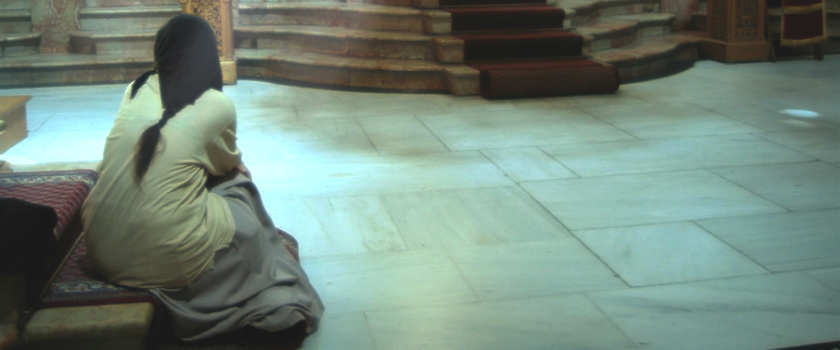Prayer requires patience...
28. Juli 2013
Abbot Gregory, Homily for 17th Sunday of Year, C (July 28, 2013)
 Woman praying in the Church of the Anastasis.
Woman praying in the Church of the Anastasis.
St. Paul once wrote to the Christians of Rome that we do not know how to pray as we ought. He was expressing a common human experience, with which I am sure we are all familiar - the feeling of incompetence, of not knowing what to do when we try to pray. Today’s gospel shows us that in this Jesus’ disciples were no different. But it must have been even worse for them because it was manifestly obvious that Jesus himself did know how to pray. St. Luke recorded in his gospel that he prayed regularly and frequently. So the question the disciples put to him, Teach us to pray, the way John the Baptist taught his disciples, was a very understandable one.
In answer to their request Jesus taught them what we call the Lord’s Prayer, recorded here by St. Luke in a shorter and probably older form than the version given by St. Matthew in his gospel. What the Lord taught them - and us - is a very Jewish prayer. We exalt God’s great name, we ask him to bring about his kingdom in our day, beg him to provide us with what we most need for life and implore him to forgive our sins and save us from the final test, in case we fall away under temptation. The words of the Lord’s Prayer remind us that in the presence of God we are weak fallible creatures, who stand before him in poverty and humility. We are utterly dependent on God’s mercy and grace. As Luther said on his death bed: “Wir sind Bettler, das ist wahr!” ( We are beggars: this is true. ) He never spoke a more true word.
But with this prayer of Jesus, St. Luke also gives us the Lord’s teaching on prayer in general. The point is that God is not like the man in the parable. He was irritated by his friend’s request and only got up unwillingly to grant it. On the contrary, God is an infinitely generous and loving Father, who wants to respond to us. He wants to shower us with his blessings. The problem is on our side, not on God’s. It is our lack of persistence, our impatience that makes us run away when our request seems to get no answer.
Jesus instructs us therefore to persevere patiently in prayer. A great monastic writer, Evagrius of Pontus, once taught that God sometimes delays his reply to our prayer so as to educate us and lead us to a deeper relationship with him. Precisely by not granting our request at once – or perhaps by granting it in a way we did not expect or even want – God teaches us that we cannot just program a response from him. He also teaches us that more important than just getting things from God is staying in his presence.
In a fast-food culture like ours’ today that is an important lesson to learn. The daily bread we ask from God, the bread that comes down from heaven, is not like the spiritual version of a Mac Donald’s burger which is quickly bought and just as quickly eaten. Prayer requires patience, because it is a relationship with God - and one cannot force a relationship. When he seems slow to answer, God is training us to wait. He is teaching us something more important. What we really need is the highest gift of all, the Holy Spirit, who alone enables us to cry, Abba, Father, and to experience that we are indeed the children of God.
Yes, St. Paul told the Romans that we do not know how to pray as we ought: but in the same passage of Scripture he added that the Holy Spirit comes to help us in our weakness. For that very reason Jesus tells us that when we pray we should aim for the heights. We should ask for - and expect to receive – the best of all gifts, the Holy Spirit, God’s own love poured into our hearts as grace.
That is something well worth waiting for.